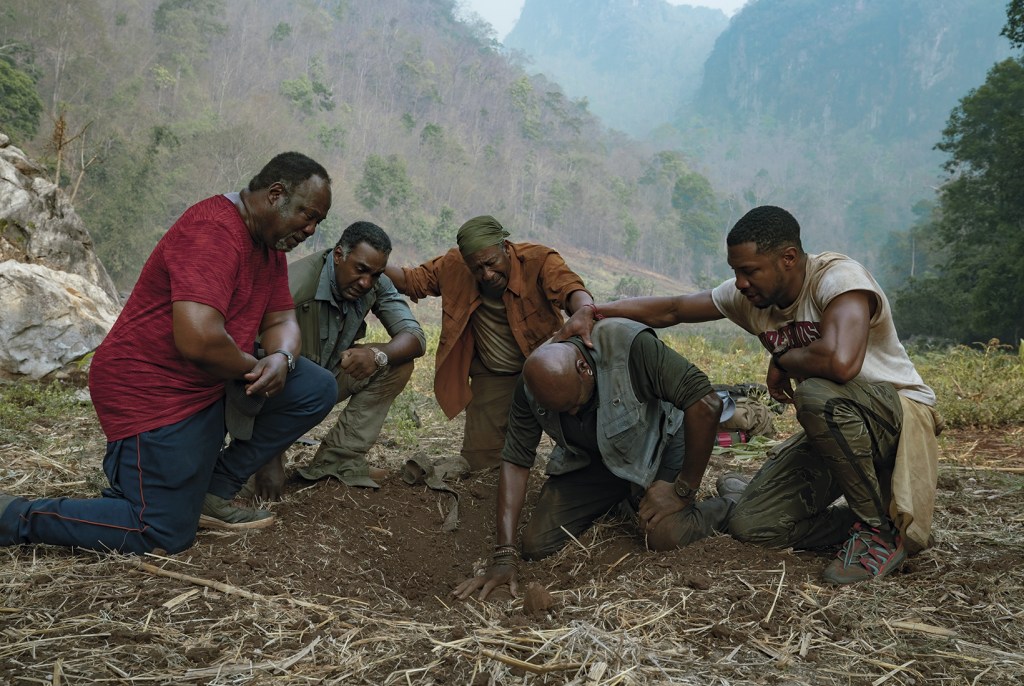Spike Lee’s Da 5 Bloods is about four African American vets who return to Vietnam to locate the body of their fallen squadron leader, retrieve the gold they buried (hopefully), reflect on fighting for a country that didn’t care about them — ‘we fought an immoral war for rights we didn’t have’ — and avoid descending into madness and despair (also, hopefully). Lee and his co-writers have said they were inspired by the classic films The Treasure of the Sierra Madre, Apocalypse Now and Bridge on the River Kwai and this does feel like several films in one. Oh, we’re in that film now, you may think to yourself. But even when Lee is all over the place he’s more interesting than many other filmmakers, and this is certainly of the moment. There have been war films with black soldiers in Vietnam before but it’s never been their story. This time round, it is.
The film, which was made for Netflix, opens with a montage of archival footage, set to Marvin Gaye, detailing the horrors of the Vietnam war and the civil rights unrest in America at that time. We then switch to the present day and our four men are reunited in a hotel in Ho Chi Minh City. They are Otis (Clarke Peters), Paul (Delroy Lindo), Eddie (Norm Lewis) and Melvin (Isiah Whitlock Jr). They are da 4 bloods and da 5th blood was their leader, Norman (Chadwick Boseman), whose body they have come to find, and whom we see in flashbacks. (During the flashbacks, the four main actors have not been de-aged, which is confusing at first, but you will get over it and it does make sense that Norman has stayed for ever young.) They are later joined by Paul’s son, David (Jonathan Majors), who teaches African American studies back home and was not invited on the trip but is concerned about his father. (With good reason, we will discover.)
They set out for the jungle where they connect, fall out, reconnect, fall out again and face snakes, heat, mosquitoes, betrayals, insanity, shoot-outs, landmines. But where’s the beautiful woman in all this, you may ask? The beautiful woman is Hedy (Melanie Thierry), the French landmine expert they hook up with. Just so you know. And in case you were worried they had forgotten to include a beautiful woman. Which they haven’t. But mostly we are concerned with the back stories of the men, how they’ve become what they’ve become, and the impact the war had on their subsequent lives.
[special_offer]
Most of the focus is on Paul, who is the most unhinged and a Trump supporter —these two facts may not be unrelated — and Otis, whose story offers up a Miss Saigon element. (Oh, we’re in that film now.) There are some terrifically tense moments — particularly one involving David and a landmine and a rope — but it doesn’t quite join all the dots in a way that brings the characters fully into being. That may be because of the genre switching, and the many tonal imbalances, which can come as a jolt. There’s also the tell-not-show element. For instance, intertitles are employed to alert us to black heroism that’s gone unrecognized, and the script contains lines such as: ‘Negroes were 11 percent of the US population but 32 percent of the troops in Vietnam.’ Black lives didn’t matter.
By the (rather silly) end, it feels almost as if the politics of race has fallen away and this is just another everyday story of individual greed. But it will keep your attention throughout, which is an achievement — running time: 154 minutes — and it is a story that has never been told but should have been. It may be all over place, but it feels absolutely necessary.
This article was originally published in
The Spectator’s UK magazine. Subscribe to the US edition here.


















